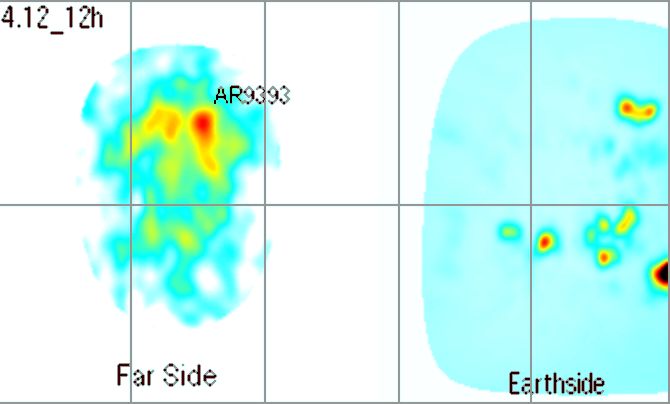
|
Explanation: You may think it's impossible to see through the Sun, but maps of the Sun's far side are now made routinely by instruments on board the sun-staring SOHO spacecraft. This is one such map from April 12. At right, is a map projection of calculated magnetic field strengths on the Earth-facing solar hemisphere with yellow and red indicating high magnetic fields characteristic of solar active regions. At left is a similar map of the solar hemisphere opposite planet Earth, which shows the large active region AR9393 as the 27-day solar rotation carried it across the far side. The largest sunspot group in a decade, AR9393 was easily seen as it tracked across the Sun's Earth-facing hemisphere in late March. When AR9393 swung around to the Sun's far side, SOHO's Michelson Doppler Interferometer (MDI) instrument continued to map its position by measuring changes in motions caused by solar sound waves - transmitted through the Sun and influenced by the active region's strong magnetic fields. Known as helioseismology, analyzing solar sound waves is like using seismological records of earthquakes to probe the interior of the Earth. On the Sun, sound waves are produced by turbulent convection cells seen on the surface as dynamic solar granules.
|
January February March April May June July August September October November December |
| ||||||||||||||||||||||||||||||||||||||||||||||||
NASA Web Site Statements, Warnings, and Disclaimers
NASA Official: Jay Norris. Specific rights apply.
A service of: LHEA at NASA / GSFC
& Michigan Tech. U.
Based on Astronomy Picture
Of the Day
Publications with keywords: ar9393 - active region - helioseismology - far side - Sun
Publications with words: ar9393 - active region - helioseismology - far side - Sun
See also:
